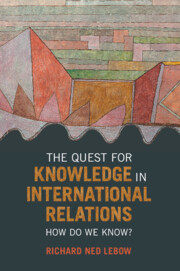Book contents
- The Quest for Knowledge in International Relations
- The Quest for Knowledge in International Relations
- Copyright page
- Dedication
- Contents
- Preface
- 1 Introduction
- Part I What Is Knowledge?
- Part II How Do We Acquire Knowledge?
- 4 Correlational Research
- 5 Experiments
- 6 Rationalism
- 7 Bottom-Up Explanations
- 8 Practice Theory
- 9 Counterfactuals
- Part III How Do We Claim Knowledge?
- Part IV Reason and Cause
- Part V Conclusions
- Index
7 - Bottom-Up Explanations
from Part II - How Do We Acquire Knowledge?
Published online by Cambridge University Press: 07 April 2022
- The Quest for Knowledge in International Relations
- The Quest for Knowledge in International Relations
- Copyright page
- Dedication
- Contents
- Preface
- 1 Introduction
- Part I What Is Knowledge?
- Part II How Do We Acquire Knowledge?
- 4 Correlational Research
- 5 Experiments
- 6 Rationalism
- 7 Bottom-Up Explanations
- 8 Practice Theory
- 9 Counterfactuals
- Part III How Do We Claim Knowledge?
- Part IV Reason and Cause
- Part V Conclusions
- Index
Summary
Interpretivism is a bottom-up approach to knowledge that starts with actors and the reasons they have for behaving as they do. I explore the problems of determining actors' motives and goals and the need for intrpretivism to develop means of studying the aggregation of actor behavior, which is what produces most outcomes.
- Type
- Chapter
- Information
- The Quest for Knowledge in International RelationsHow Do We Know?, pp. 103 - 112Publisher: Cambridge University PressPrint publication year: 2022

